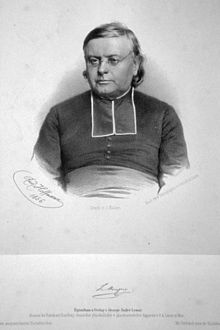François Napoléon Marie Moigno

François-Marie-Napoléon Moigno ( Abbé Moigno ) (born April 15, 1804 in Guémené-sur-Scorff , Département Morbihan , † July 14, 1884 in Saint-Denis (Seine-Saint-Denis) ) was a French mathematician, physicist and Author.
He received his early education at the Jesuit college in Sainte-Anne-d'Auray , entered the novitiate of the order on September 2, 1822 and studied theology in Montrouge . In his free time he devoted himself to mathematics and physics.
When the July Revolution of 1830 broke out , he moved with the Jesuits to Brig in Switzerland. Here he learned several languages, including Hebrew and Arabic. In 1836 he was appointed professor of mathematics at the Lycée privé Sainte-Geneviève in Paris . Here he became known not only as a scientist, but also as a preacher and writer.
He went on a trip to Europe. 1848–51 he was chaplain of the Lycée Louis-le-Grand. In 1850 he became scientific editor of La Presse , in 1851 of La Pays and in 1852 he founded the magazine Cosmos . In 1862 he also founded Les Mondes . In 1873 he was elected Canon of the Chapter of Saint-Denis (Seine-Saint-Denis).
The moon crater Moigno is named after him.
Publications
- Leçons de Calcul Differentiel et de Calcul integral
- Répertoire d'optique moderne ; Paris, 1847-1850
- Traité de télégraphie électrique ; Paris, 1849
- Leçons de mécanique analytique ; Paris, 1868
- Saccharimetry ; Paris, 1869
- Optique moléculaire ; Paris, 1873
- Les splendeurs de la foi ; Paris, 1879–83
- Les livres saints et la science ; Paris, 1884
- and numerous articles in the Comptes Rendus , Revue Scientifique , Kosmos etc.
Individual proof
| personal data | |
|---|---|
| SURNAME | Moigno, François Marie Napoléon |
| ALTERNATIVE NAMES | Moigno, Abbé; Moigno, François-Marie-Napoléon |
| BRIEF DESCRIPTION | French mathematician, physicist and author |
| DATE OF BIRTH | April 15, 1804 |
| PLACE OF BIRTH | Guémené-sur-Scorff |
| DATE OF DEATH | July 14, 1884 |
| Place of death | Saint-Denis (Seine-Saint-Denis) |